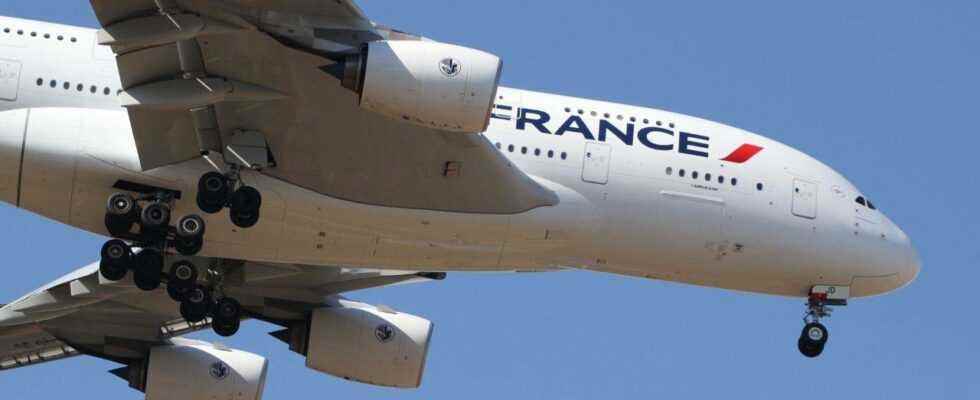(AOF) – The strike started on Wednesday at Transavia France, a subsidiary of Air France-KLM, is not running out of steam. Also, the low cost airline announced the elimination of 30% of its flights on Friday and Saturday. For Sunday, 25% of flights should be canceled.
AOF – LEARN MORE
Key points
– European number 1 in air transport, born in 2000 from the merger between Air France, created in 1933, and the Dutch KLM, founded in 1019;
– Turnover of €14.3 billion achieved 86% in passenger transport and cargo, then maintenance for 7% and the Transivia subsidiary for 7%;
– Business model based on optimizing the use of the fleet, improving operational performance, simplifying structures and connectivity on the one hand, growing the short and medium-haul network and developing long-haul by alliances (alliance of 19 airlines in SkyTeam) and partnerships;
– Capital held 28.6% by the French State, 9.3% by the Dutch State, 8.8% by Delta Airlines, 8.8% by China Airlines and 3.7% by employees, Anne- Marie Couderc chairing the board of directors of 19 administrators, Benjamin Smith being general manager;
– Tense balance sheet situation with net debt at €8.2 billion, i.e. a leverage effect of 11 but capital increase expected up to €4 billion by the end of 2022.
Challenges
– Transformation strategy via organisation, cost reduction, fleet management and transfer to Transavia of the French domestic network excluding Marseille, Nice and Toulouse: debt leverage reduced to 3-3.5% in 2023, operating margin of 7 to 8% in 2024;
– Innovation strategy: at the service of the attentive relationship with the customer (massive use of voice assistance techniques, artificial intelligence, blockchain and augmented reality), towards clean aviation, support for sustainable fuels, electric taxiing for ground towing , atmosphere monitoring…;
– Environmental strategy aiming to reduce CO2 emissions by 50% (vs 2005): Climate Plan with 6 priorities including modernization of the fleet (€2.5 billion invested in aircraft consuming 25% less fuel), sustainable fuels in based on SkyNRG, compensation plan with the CORSIA system / fight against noise pollution, / 60% recycling of hazardous waste in 2020 and reduction, by 2030, of residual waste by half and commitment to biodiversity;
– Continued success of Transavia – expected return of seat occupancy above 2019 levels.
Challenges
– No return to 2019 traffic levels before 2024-25 and uncertainties over the reopening of Chinese airports;
– Benefits from the strengthening of the partnership, industrial and capitalistic, with China Eastern;
– Resistance to the rise of competition in maintenance;
– Outlook for 2022, after the return to operating profitability in the 1st quarter: for the 2nd quarter: capacity in seat-km offered for the networks at 80-85% vs 2019 and break-even operating result / for the 3rd quarter, capacity in seat-km from 85 to 90% and clearly positive operating result
– No dividend payment in 2021 (for the 7th consecutive year).
Once again weakened results for European airlines
With fuel accounting for up to 35% of their costs, professionals believe European airlines are unlikely to return to profit until 2023 or 2024 at the earliest. These players predict that energy prices will remain high at least until 2023. The International Air Transport Association (IATA) has announced a forecast of cumulative losses of 9.7 billion dollars in 2022 for airlines at around the world, it will still be necessary to wait until 2023 to see the return to profits on a global scale, due in particular to the surge in oil costs and the rise in labor costs. On the positive side, travel demand seems to be resisting the uncertainties caused by the international economic and political situation. However, the uncertainties concerning the Covid, the war in Ukraine, as well as the rise in prices are reinforcing last-minute reservations. According to Iata, only 8% of international reservations made at the end of May went beyond September.
The social climate is deteriorating in low-cost companies
These companies are benefiting from a very strong recovery. They had already managed to monopolize 40% of air traffic in 2021, this proportion could even rise to 50% this year. However, strike movements have affected the activity of Volotea, EasyJet and Ryanair, with confrontations over pay and working conditions. In general, the sector faces a shortage of personnel. After having severely cut their workforce in 2020 and 2021, companies and airports must urgently recruit to support the relaunch of activity.
